#AI identity verification
Explore tagged Tumblr posts
Text
Sam Altman’s Eye-Scanning Startup ‘World’ Expands to the UK to Tackle AI Fraud
World, the controversial biometric identity verification venture co-founded by OpenAI CEO Sam Altman, is launching in the United Kingdom this week as it continues its global rollout to combat rising concerns around AI-driven fraud.
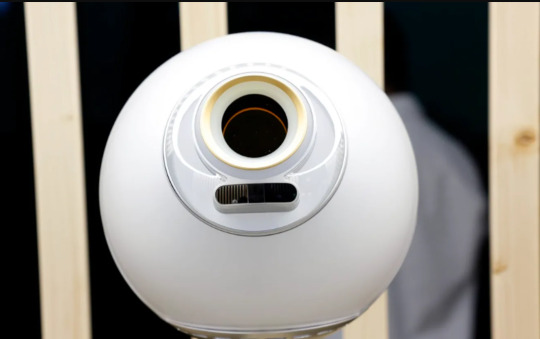
Starting Thursday, Londoners will be able to register for World’s unique identity system using the Orb—a spherical, metallic eye-scanning device that captures a person’s iris and facial data to generate a unique biometric code. The startup plans to expand the service to other major UK cities, including Manchester, Birmingham, Cardiff, Belfast, and Glasgow in the coming months.
World’s technology aims to verify a user’s “humanness,” preventing bots and artificial intelligence systems from exploiting online services through deepfakes, identity theft, and other forms of fraud.
From Science Fiction to Mainstream Use
“The idea is no longer just something theoretical. It’s something that’s real and affecting people every single day,” said Adrian Ludwig, Chief Architect at Tools for Humanity, a key contributor to World. “We’re moving from a science project to a real network.”
Once a person is scanned, they receive a World ID—an anonymous digital identifier—and a small amount of WLD cryptocurrency. The ID can be used to log into participating platforms like Minecraft, Reddit, and Discord without revealing the user’s personal identity.
Growing Global Footprint
The UK expansion follows World’s recent launch in the United States, where it opened six flagship retail locations in cities including Austin, Atlanta, Los Angeles, Nashville, Miami, and San Francisco.
Ludwig said the company is aiming to scale its verification capacity tenfold over the coming months. As of now, 13 million users worldwide have verified their identity through World.
Privacy Concerns and Regulatory Dialogue
Since its 2021 debut as “Worldcoin,” the startup has faced scrutiny over privacy and biometric data usage. To address concerns, World says it encrypts all biometric data, deletes the original scans, and processes data locally on user devices rather than in the cloud. Only uniqueness verification is handled through third-party infrastructure.
Still, privacy campaigners remain wary of deploying such a system at scale, particularly in countries with millions—or even billions—of users. World has been actively engaging with regulators, including the UK’s Information Commissioner’s Office (ICO), to ensure compliance with data protection laws.
“We’ve had a lot of conversations with regulators,” Ludwig told CNBC. “They want to know: How do we make sure this works? How do we protect privacy? What are the risks? We’ve been able to answer all of those.”
A Digital Identity Shift
World’s expansion comes as governments worldwide explore digital identity solutions to move beyond physical ID cards. Ludwig sees the project as part of a broader shift toward more secure and scalable digital ID systems, especially in the face of increasingly sophisticated AI fraud.
While initiatives like India’s Aadhaar have demonstrated both the potential and pitfalls of digital ID at scale, World aims to offer a decentralized alternative—one that doesn't compromise privacy or security.
“Mechanisms to identify and reduce fraud are of growing interest to governments,” Ludwig said. “And we’re seeing real demand now.”
As digital identity becomes a central pillar of both public and private sector security infrastructure, World’s UK rollout marks a significant step in building a global network to defend against the rising risks of AI misuse.
#Sam Altman#Worldcoin#World ID#AI identity verification#biometric authentication#UK tech news#iris scanning#Orb device#AI fraud prevention#OpenAI CEO
0 notes
Text
Instant Identity Verification with Face Match API – Gridlines

Experience seamless identity verification with Gridlines' Face Match API. Simply click a selfie and upload your ID to enable instant face matching powered by AI. Ideal for digital KYC, user onboarding, and fraud prevention, this API ensures accuracy, security, and real-time results. Whether you're in fintech, HR tech, or insurance, streamline your verification process with just a few clicks. Try Gridlines' Face Match API for faster, smarter onboarding today.
#face match API#facial recognition#digital KYC#identity verification#AI-powered KYC#liveness check#selfie verification#document verification#real-time face match#Gridlines API#fraud prevention#user onboarding
0 notes
Text
The Rise of AI-Powered Embassies: Faster Visas, Fewer Lines
Let’s face it—nobody likes waiting in line at the embassy. It’s slow, it’s stressful, and it often feels like a test of patience more than a process. But in 2025, the embassy game is changing—fast. Thanks to AI, embassies are becoming smarter, faster, and more user-friendly than ever before. Welcome to the age of AI-powered embassies. No More Paper Trails: The Digital Shift Remember the days of…
0 notes
Text
A snarky dive into AI checkpoints and the 0 Trust Initiative. Are you who you say you are? Checkpoint Chronicles investigates.

View On WordPress
#AI checkpoint#AI satire#blog fiction#checkpoint chronicles#Clint.exe#Humor#identity verification#Joseph Kravis#Unit-39B#zero trust initiative
0 notes
Text
🔍 AI-powered facial recognition is changing security & identity verification! From law enforcement to finance, this tech enhances safety but raises ethical concerns. 🌐 Learn more about the future of AI security & privacy! 👇 #AI #FacialRecognition #CyberSecurity
#AI facial recognition#AI security#biometric security#deep learning#Ethical AI#Future of AI#identity verification#privacy concerns#smart surveillance
0 notes
Text
Trusted Document Verification software| Zionitai
Zioshield is an advanced online document verification software that ensures the authenticity of identity documents like Aadhar, PAN, and passports.
online document verification Software
document verification company in india
Document Security Solutions
Identity Verfication AI
document verification service
id document verification
#online document verification Software#document verification company in india#Document Security Solutions#Identity Verfication AI#document verification service#id document verification
0 notes
Text
Mandatory Age Verification For Social Media
I had a conversation with Copilot about Mandatory Age Verification For Social Media.
The proposed Social Media Ban for under-16s by the Australian federal ALP government involves Age Verification methods that include providing ID and biometrics, such as face scanning. This approach raises significant concerns about privacy and the potential for creating a de facto Digital ID system.
Practical Implications • ID Verification: Users would need to provide some form of identification to verify their age. This could include government-issued IDs, like passports or driver's licenses.
• Biometric Data: Face scanning or other biometric methods would be used to ensure the person presenting the ID is the same person using the social media account.
• Data Collection: This process would result in the collection of sensitive personal data, including biometric information, which could be stored and potentially used for other purposes.
Concerns • Privacy: The collection and storage of biometric data and personal IDs raise significant privacy concerns. There is a risk of data breaches and misuse of this information.
• Digital ID System: While the primary goal is age verification, the requirement for biometric data and IDs effectively creates a Digital ID system for social media users.
• Accessibility: Not everyone may have access to the required forms of ID or be comfortable with biometric verification, potentially excluding some users from social media platforms.
Conclusion In practical terms, the proposed age verification methods resemble the creation of a Digital ID system.
The Digital ID Program The Digital ID Program of the Australian government is designed to be voluntary, providing a secure and convenient way for individuals to verify their identity online. However it raises concerns about the proposed Social Media Ban potentially leading to a de facto compulsory Digital ID system.
Key Points • Voluntary Nature: The current Digital ID system is voluntary, allowing individuals to choose whether or not to use it.
• Age Verification: The proposed social media ban for under-16s involves age verification methods that include providing ID and biometrics, such as face scanning.
• Potential For Compulsory Use: While the Digital ID system is voluntary, the requirement for age verification on social media platforms could effectively make it compulsory for those who wish to use these services.
Conclusion The introduction of Mandatory Age Verification For Social Media could definitely be seen as a step towards a more widespread use of Digital ID, potentially leading to concerns about privacy and the implications of a de facto compulsory system.
The Social Media Ban Is The Vaccine Passport Program Revisited Voluntary programs can evolve into mandatory requirements over time. During the Covid-19 pandemic, Vaccine Passports initially presented as voluntary measures soon became essential for accessing certain services and venues. This shift highlighted concerns about how "voluntary" programs can, in practice, become quasi-mandatory.
Parallels Between Vaccine Passports and Digital ID For Social Media • Initial Voluntariness: Both vaccine passports and the current Digital ID system started as voluntary initiatives.
• Increased Necessity: Over time, certain activities (like entering premises during the pandemic) or services (like accessing social media) required compliance with these "voluntary" measures.
• Privacy Concerns: Both programs raise significant privacy concerns, particularly regarding the collection and use of personal and biometric data.
• Public Trust: The shift from voluntary to mandatory can erode public trust and lead to resistance or backlash.
Conclusion The potential trajectory of the Social Media Ban, requiring ID and biometrics for age verification, could mirror the path of Vaccine Passports, effectively making Digital ID a necessity for certain activities.
#copilot#copillot ai#politics#social media ban#social media#vaccine passports#digital identity#digital id#privacy#data breach#biometric verification
1 note
·
View note
Text
youtube
Identify and mitigate potential check fraud in real-time using Simplici. Our all-in-one solution, fueled by AI and biometrics, seamlessly conducts identity verification, promptly alerts bankers and risk teams to potential fraud, and conveniently compiles all customer information within our Single Source Compliance portal. Give your team the right tools to stop fraud before it starts. Timely. Safely. Simplici. Find out more: https://simplici.io/
#identity verification solutions#simplicilivenesschecks#cybercrime#fraud prevention#ai#Bankfraud#MobileSecurity#CheckFraud#SimpliciDefense#Youtube
0 notes
Text
Portal hlvrai crossover....au......

SOME OF MY THOUGHTS AND IDEAS are under the cut!!
1) I always found it really funny how aperture has this insane amount of "what to do in case of an alien invasion" recordings. I mean...they had to record them BEFORE the actual invasion started right? They were completely delusional and ended up right. My idea was, that in this wild mix/ swap of Aperture and Black mesa, Black mesa decided to build a security system ai - Benrey. First to keep all the important stuff away from contenders (hence his obsession with identity verification), and then they upgraded the guy to keep the laboratory intact if some crazy alien shit starts to happen. And it did. Now, years in the future, recently awakened from his stasis Gordon has to make his way out of the Laboratory with Benrey on his tail. At first he helps him, but ..well...Gordon doesn't have his id and breaks company property in his attempts to escape so their "friendship" doesn't last long.
2) I also had an idea of making Gman a management core of the lab. He hires personal, keeps everything organised and technically runs the place. When everything went down he just put everyone to sleep to keep the company assets intact. Eventually he broke down, which transferred most of the control functions to Benrey and killed most of the people that were put in the stasis
3) Tommy is a reserve version of the management core. Gman was supposed to be replaced by him if anything went wrong with him, but...well...there were no conscious scientists to do that. To escape from the lab Gordon needs to transfer control of the lab from Benrey to Tommy.
4) They are followed by Coomer and Bubby, who were initially made as testing androids, but now think about themselves as scientists
5) my friend (@/mrrrcesare !!!!) and I joked about Tommy being an orphan that was raised by the turrets. You can call him...Tommy Turretta.... ANYWAYS, as he is a reserve piece of a really important technology, Black mesa saw fit to give him turret guns and fill him with bullets, so despite him not having any hands in this au, he still has a trigger finger
2K notes
·
View notes
Text
In honour of Katniss’ birthday yesterday, I invite everyone to also remember the real-life men, women, and children in Palestine enduring unimaginable suffering in the midst of an actual war. To be aware of the censorship being deployed against protesters of this violence by corporations at the hand of unjust governments.
As you may or may not know, on the 6th of May, Macklemore released a song called "HIND’S HALL" in support of Palestine, where 100% of proceeds from streaming will go to supporting UNRWA.
Hind Rajab was a 6-year-old girl from Gaza. In January 2024, she and her family were shelled by the Israeli army while in their car. Hind and her 15-year-old cousin, Layan Hamadeh, were the only survivors, trapped within the car. They called the Palestinian Red Cross Society, with Layan saying, "They are shooting at us. The tank is right next to me. We're in the car, and the tank is right next to us." The PCRS sent a team to rescue them. However, after 12 days, on February 10th, when the Israeli army withdrew from the area, Hind Rajab and her six relatives were found dead in the car, along with the two paramedics sent to rescue them, who were also found dead nearby.
The song is not available on Spotify yet. It is not available on Apple Music yet. It’s available only on Youtube, where—for the first time in the 15+ years i’ve been using Youtube—they have placed an 18+ age restriction on the video that includes multi-step age verification, where viewers must prove their age with a government ID, credit card, or submit a photo of themselves to an AI age recognition program (that oftentimes won’t even load).
This is absolutely abhorrent of Youtube/Google to censor this video, especially in the light of the recent attacks on Rafah, where thousands of Palestians have been cornered in what was previously considered the final "safe" zone.
Macklemore has since reuploaded a second video including audio only which has not been age restricted (yet), but the lack of imagery greatly alters the impact of his message. Many people may not feel comfortable verifying their identity to a corporation we know to be corrupt. Others may not be "old enough" to see it, though as the next generation of voters, as the primary group fighting for peace, you all deserve to see the truth of what’s happening in the world. I have screenrecorded the video and attached it to this post, but if there’s any of you who have already verified your age or feel comfortable doing so, please visit and interact with the original video here to contribute to aid efforts. If you are under 18 or do not wish to verify your age, the audio only video can be found here. Remember that your streams hold power, and even those who have nothing to give themselves can make an impact.
Additionally, most of the people who interact with my blog are Hunger Games fans. You were all outraged when the men, women, children, medics were bombed in the books, when it was fictional characters. So why would you stay silent when it’s happening in real life?
Free Palestine. 🍉
#free palestine#free gaza#palestine#gaza#gaza genocide#the hunger games#thg#katniss everdeen#peeta mellark#everlark#gale hawthorne#haymitch abernathy#effie trinket#primrose everdeen#finnick odair#johanna mason#annie cresta
188 notes
·
View notes
Text
These days, when Nicole Yelland receives a meeting request from someone she doesn’t already know, she conducts a multi-step background check before deciding whether to accept. Yelland, who works in public relations for a Detroit-based non-profit, says she’ll run the person’s information through Spokeo, a personal data aggregator that she pays a monthly subscription fee to use. If the contact claims to speak Spanish, Yelland says, she will casually test their ability to understand and translate trickier phrases. If something doesn’t quite seem right, she’ll ask the person to join a Microsoft Teams call—with their camera on.
If Yelland sounds paranoid, that’s because she is. In January, before she started her current non-profit role, Yelland says she got roped into an elaborate scam targeting job seekers. “Now, I do the whole verification rigamarole any time someone reaches out to me,” she tells WIRED.
Digital imposter scams aren’t new; messaging platforms, social media sites, and dating apps have long been rife with fakery. In a time when remote work and distributed teams have become commonplace, professional communications channels are no longer safe, either. The same artificial intelligence tools that tech companies promise will boost worker productivity are also making it easier for criminals and fraudsters to construct fake personas in seconds.
On LinkedIn, it can be hard to distinguish a slightly touched-up headshot of a real person from a too-polished, AI-generated facsimile. Deepfake videos are getting so good that longtime email scammers are pivoting to impersonating people on live video calls. According to the US Federal Trade Commission, reports of job and employment related scams nearly tripled from 2020 to 2024, and actual losses from those scams have increased from $90 million to $500 million.
Yelland says the scammers that approached her back in January were impersonating a real company, one with a legitimate product. The “hiring manager” she corresponded with over email also seemed legit, even sharing a slide deck outlining the responsibilities of the role they were advertising. But during the first video interview, Yelland says, the scammers refused to turn their cameras on during a Microsoft Teams meeting and made unusual requests for detailed personal information, including her driver’s license number. Realizing she’d been duped, Yelland slammed her laptop shut.
These kinds of schemes have become so widespread that AI startups have emerged promising to detect other AI-enabled deepfakes, including GetReal Labs, and Reality Defender. OpenAI CEO Sam Altman also runs an identity-verification startup called Tools for Humanity, which makes eye-scanning devices that capture a person’s biometric data, create a unique identifier for their identity, and store that information on the blockchain. The whole idea behind it is proving “personhood,” or that someone is a real human. (Lots of people working on blockchain technology say that blockchain is the solution for identity verification.)
But some corporate professionals are turning instead to old-fashioned social engineering techniques to verify every fishy-seeming interaction they have. Welcome to the Age of Paranoia, when someone might ask you to send them an email while you’re mid-conversation on the phone, slide into your Instagram DMs to ensure the LinkedIn message you sent was really from you, or request you text a selfie with a timestamp, proving you are who you claim to be. Some colleagues say they even share code words with each other, so they have a way to ensure they’re not being misled if an encounter feels off.
“What’s funny is, the low-fi approach works,” says Daniel Goldman, a blockchain software engineer and former startup founder. Goldman says he began changing his own behavior after he heard a prominent figure in the crypto world had been convincingly deepfaked on a video call. “It put the fear of god in me,” he says. Afterwards, he warned his family and friends that even if they hear what they believe is his voice or see him on a video call asking for something concrete—like money or an internet password—they should hang up and email him first before doing anything.
Ken Schumacher, founder of the recruitment verification service Ropes, says he’s worked with hiring managers who ask job candidates rapid-fire questions about the city where they claim to live on their resume, such as their favorite coffee shops and places to hang out. If the applicant is actually based in that geographic region, Schumacher says, they should be able to respond quickly with accurate details.
Another verification tactic some people use, Schumacher says, is what he calls the “phone camera trick.” If someone suspects the person they’re talking to over video chat is being deceitful, they can ask them to hold up their phone camera to their laptop. The idea is to verify whether the individual may be running deepfake technology on their computer, obscuring their true identity or surroundings. But it’s safe to say this approach can also be off-putting: Honest job candidates may be hesitant to show off the inside of their homes or offices, or worry a hiring manager is trying to learn details about their personal lives.
“Everyone is on edge and wary of each other now,” Schumacher says.
While turning yourself into a human captcha may be a fairly effective approach to operational security, even the most paranoid admit these checks create an atmosphere of distrust before two parties have even had the chance to really connect. They can also be a huge time suck. “I feel like something’s gotta give,” Yelland says. “I’m wasting so much time at work just trying to figure out if people are real.”
Jessica Eise, an assistant professor studying climate change and social behavior at Indiana University-Bloomington, says that her research team has been forced to essentially become digital forensics experts, due to the amount of fraudsters who respond to ads for paid virtual surveys. (Scammers aren’t as interested in the unpaid surveys, unsurprisingly.) If the research project is federally funded, all of the online participants have to be over the age of 18 and living in the US.
“My team would check time stamps for when participants answered emails, and if the timing was suspicious, we could guess they might be in a different time zone,” Eise says. “Then we’d look for other clues we came to recognize, like certain formats of email address or incoherent demographic data.”
Eise says the amount of time her team spent screening people was “exorbitant,” and that they’ve now shrunk the size of the cohort for each study and have turned to “snowball sampling” or having recruiting people they know personally to join their studies. The researchers are also handing out more physical flyers to solicit participants in person. “We care a lot about making sure that our data has integrity, that we’re studying who we say we’re trying to study,” she says. “I don’t think there’s an easy solution to this.”
Barring any widespread technical solution, a little common sense can go a long way in spotting bad actors. Yelland shared with me the slide deck that she received as part of the fake job pitch. At first glance, it seemed like legit pitch, but when she looked at it again, a few details stood out. The job promised to pay substantially more than the average salary for a similar role in her location, and offered unlimited vacation time, generous paid parental leave, and fully-covered health care benefits. In today’s job environment, that might have been the biggest tipoff of all that it was a scam.
27 notes
·
View notes
Text
🚨Scammer Alert🚨 + 🔎Scam Exam(ination)🔍
Seen as: Recruitment to join the Illuminati Scam Type: Identity Theft / Fraud
Post updated: 2/14/25
Accounts running this scam: templeoflight66 symbolsand-shadow mysticmason googlescholarsecretsandsybmols illuminatiinsights thehiddenodex
-----
Before we dive into this scam, please note that this scam is very dangerous as it reportedly deals with identity theft and concludes with the theft and use of your stolen information for nefarious purposes.
As it should go with any stranger you talk to on the internet, you should never willingly give out any of your personal information such as: real name, date of birth, address, phone number, credit card/bank information, photos of yourself or your bank, credit, social security card, ect, to a stranger on the internet who promises you money.
1 - How it starts.
This scam typically starts by someone receiving an email, or in the images we will be examining today, a tumblr user receiving a DM- or, well, several DM's, from users who were trying to 'bless them with good tidings of the universe' and that it was 'a sign from the almighty' and 'it was fate' and all that nonsense... to try and then recruit them to join the Illuminati.
The following images were provided by an anonymous user of their conversation with googlescholarsecretsandsybmols:
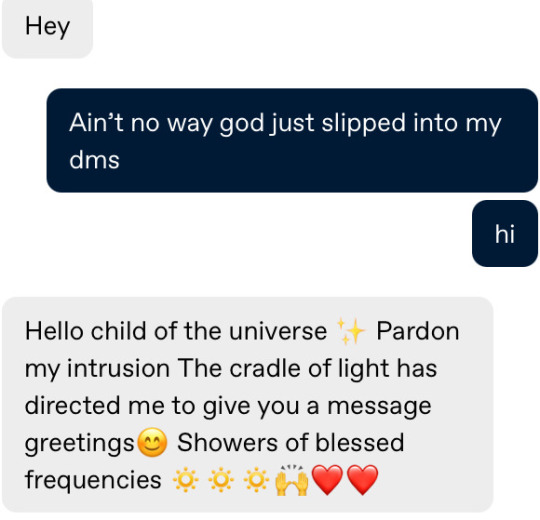
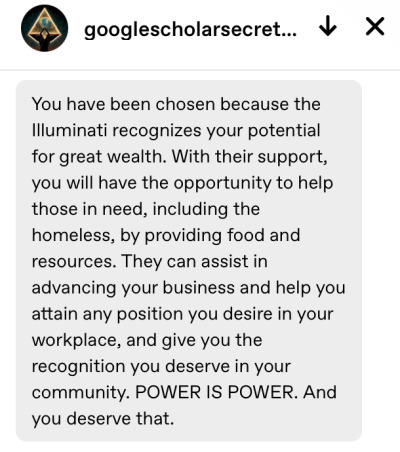
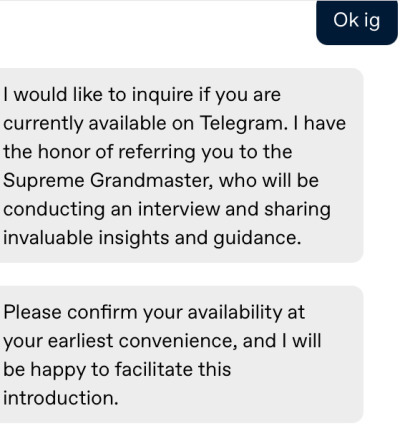
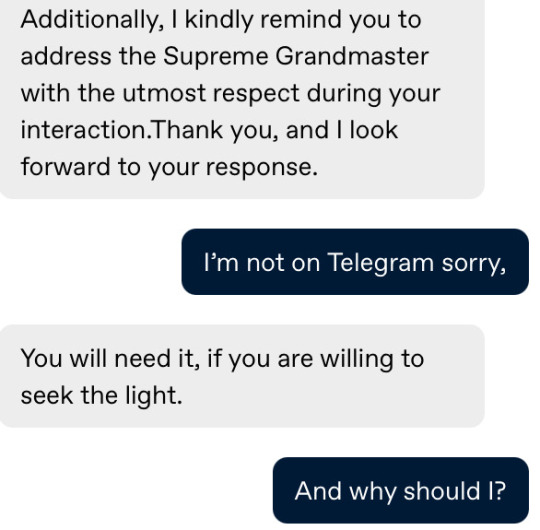
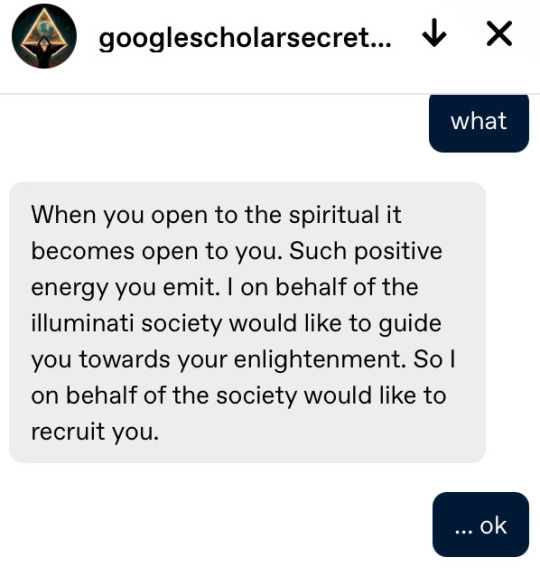
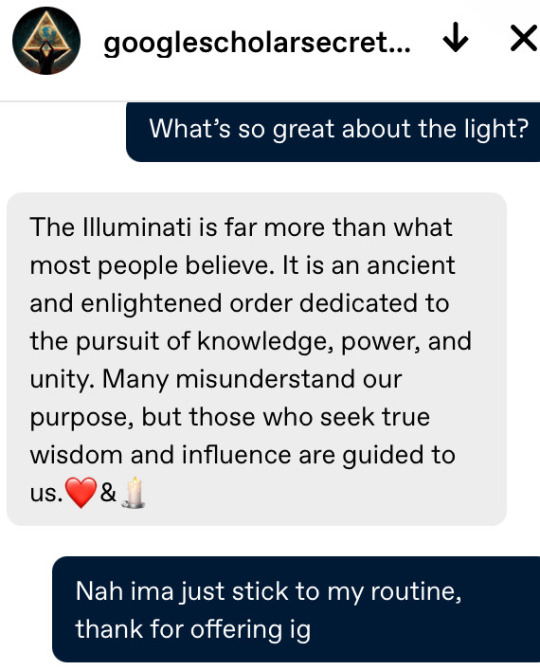
Here is anonymous's contact with mysticmason:
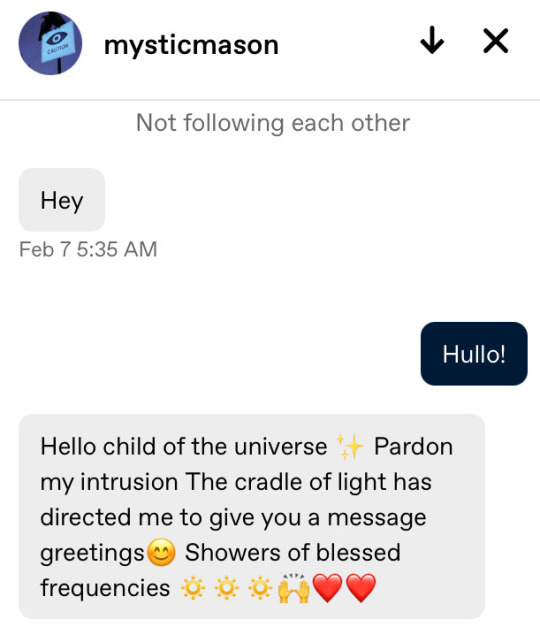
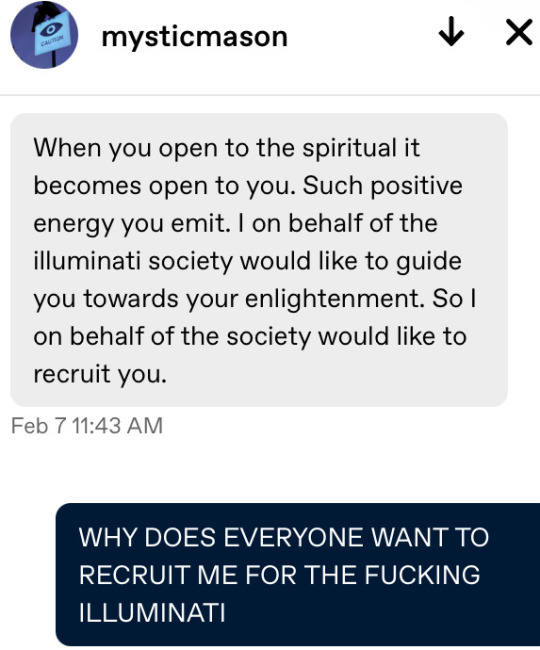
🚩Notable red flags🚩
Their blogs are full of generic AI generated images, philosophical scripture/nonsense, links to Illuminati websites/content that seem suspicious.
The offer of the impossible.
Wealth (of an undisclosed amount) to help the homeless with food and resources. Some 'means' of aiding your business and/or helping you attain any job position you desire in your work place. Some ✨magical✨ means of granting you recognition in your community. (As if they can suddenly make people change their opinions of you...)
Then instant request/demand that they need you to use Telegram for communication.
Telegram is a service that a lot of scammers use, and they use it because they can easily communicate with other scammers (and victims) there, and run their scams through it without it usually being able to be used as evidence should something like Identity Theft occur.
2 - How this scam works.
This scam works by... well, what I find to be the most obvious tactic that a lot of scammers use:
The life changing offer of a lot money... You just need to do a little something in return... ;)
From here I will be pulling information from this article from Bitdefender, one of the most well known and well trusted Antivirus brands on the market today. (That I use in fact! :D)
In regards to the emails- the original method this scam was spread:
The spam emails were traced to IP addresses in Nigeria (40%), South Africa (16%), the US (14%), the Netherlands (13%), and Argentina and Brazil (with 5% each).
Here are a list of benefits the Illuminati claims they can offer you if you join, taken from the Bitdefender article as well:
A new house bought in any country of your choice.
A monthly salary of $200,000
A blessing for joining which includes 10 million dollars.
A "magic talisman" that can cure any kind of illness or infection.
The power to prosper and improve.
Free access to Bohemians grove.
First class/VIP treatment at any airport in the world.
One-year appointment approval with the top 10 world leaders.
Appointments with world celebrities of your choice.
A personal car with your name customized on it.
The seven-book of Moses to learn the language of ORIS for "powers".
And a lot more!...
You just have to buy the required items for you to become an initiate member into the 'brotherhood.'
Which is when they'll have you fill out a sheet with all of your personal information, work occupation, wage earnings, as well as request a photograph of you and/or your license for 'verification'.
If you do, they will steal your identity, use it to register for things like loans, ruin your credit, and your life is practically ruined. :(
Final Thoughts:
As I mentioned prior, you should never send this kind of information to anyone on the internet for any kind of reason if you do not know who you are speaking to on the other end, aka they're a stranger.
All these kinds of scams go off of are words, as that's all they are.
A promise made of just words.
No different than the free money or sugar baby/daddy scam where they promise you $3000 a month, all you have to do is 'send me $100+ to verify you want to do this.'
I know how life changing a lot of money can be, but do try to be logical and think about these things, for your sake and others!
Take care everyone.
#scam#scams#scam alert#scammer#scam awareness#scammers#scam warning#online scams#psa#internet safety#public service announcement#illuminati scam#templeoflight66#symbolsand-shadow#mysticmason#googlescholarsecretsandsybmols#illuminatiinsights#illuminati#conspiracy#thehiddenodex
30 notes
·
View notes
Text
Face Match API: Accelerate KYC with Secure Facial Verification
In the digital-first world, verifying someone's identity needs to be fast, reliable, and fraud-proof. That’s where a Face Match API comes in — offering businesses an automated, AI-powered way to confirm if a person’s selfie matches the photo on their ID document. Gridlines’ Face Match API is designed to do just that, enabling real-time identity verification for seamless KYC (Know Your Customer) processes.

What Is a Face Match API?
A Face Match API is a technology solution that compares two facial images — typically a selfie and an ID photo — to determine if they belong to the same person. It’s often used in KYC, onboarding, and fraud prevention workflows across fintech, insurance, and workforce platforms.
With Gridlines' API, businesses can integrate this capability into their mobile apps or platforms to instantly verify users, detect spoofing attempts, and maintain regulatory compliance.
Why Use Gridlines' Face Match API?
Gridlines offers a powerful and flexible Face Match API that delivers:
Real-time facial comparison with match scores
Liveness detection to stop spoofing (e.g., photo/video attacks)
Seamless integration via REST APIs
Scalability for high-volume verifications
Secure and encrypted data handling
Whether you're onboarding gig workers, verifying customers for loans, or conducting background checks, Gridlines’ face match API helps ensure the person is who they say they are.
Real-World Use Case
A digital lending platform needs to verify users quickly without manual intervention. By using the Face Match API from Gridlines, they can match a user’s selfie to the photo on their Aadhaar card in real-time. If the match score is above the set threshold and liveness is confirmed, the user is instantly approved — reducing drop-offs and increasing trust.
Benefits for Your Business
✅ Reduce onboarding time from days to seconds
✅ Prevent identity fraud with AI-based checks
✅ Stay compliant with digital KYC norms
✅ Offer users a smoother, mobile-friendly experience
Built for Developers
Gridlines make it easy to integrate facial matching into your existing system. The API is well-documented, comes with sample payloads, and is backed by technical support — so your team can go live faster.
Get Started Today
If your business relies on identity verification, the Face Match API from Gridlines is your key to faster, safer KYC. Explore the product to see how you can transform your verification process with just a few lines of code.
#face match API#facial recognition#digital KYC#identity verification#selfie match#upload ID#AI verification#liveness detection#Gridlines API#real-time KYC
0 notes
Text
Since its debut, privacy and public health experts have pointed with alarm to a number of significant oversights in Calmara’s design, such as its flimsy consent verification, its potential to receive child pornography and an over-reliance on images to screen for conditions that are often invisible.
But even as a rudimentary screening tool for visual signs of sexually transmitted infections in one specific human organ, tests of Calmara showed the service to be inaccurate, unreliable and prone to the same kind of stigmatizing information its parent company says it wants to combat.
37 notes
·
View notes
Text

Are you digikin? Are you looking for a place to hang out with other digikin to chat about kinstuff? Then consider joining The Net Ocean, a brand-new digikin Discord server!
Features:
PluralKit, for anyone who needs it, and a channel specifically for headmate introduction threads!
Appy for verification--- no need to worry about randos coming in to the server!
React roles to help show other people what canons you connect to, including roles for more obscure sources like the Xros Wars Manga, Appmon, and original media!
Rules:
Please be respectful of fellow members of the server. This server is intended to be a comfortable space for all kinds of digikin. Respect everyone's pronouns and identities. Failure to do so will result in administrative action depending on the severity of the issue. There is no tolerance for things such as racism, ableism, homophobia, or transphobia here.
This server is only for adults (18+). This is for ease of moderation. If you are found to be lying about your age and are a minor, you will be banned from the server, no exceptions. That said, don't be needlessly crude. If the need for NSFW chats arises, keep riskier topics to it. No one wants to be jump scared by messages that could get them fired.
We are an explicitly plural inclusive server. That means that, to join, you must be accepting of different system structures, be they traumagenic, endogenic, or anything between or without. We do not consider "endo-neutral" to be an inclusive stance, as this often implies an expectation for endogenic systems to "prove" their existence.
This server is run by a system that would generally be considered an "anti." If this bothers you, we would not recommend this server for you. This warning is provided for your comfort as much as ours, as we understand that those labels or the perception of them can come across as antagonistic.
Piggybacking off of that, while in this server please refrain from engaging in discourse subjects. The hard rules set above exist for a reason, but we are all complex individuals, and discourse can often devolve quickly into fights. We understand that the presence of Rule 4 to begin with is, in itself, discourse, but further discussion in the server of these topics (such as shipping discourse) is discouraged.
Similarly, let's try to leave heavier topics at the door. For the time being, outside of memory vent channels, we will not be opening vent channels in this server. Right now the world is a mess, but let's not make this a space to talk about it.
Try to stay relatively on-topic to a given channel. If you find yourself drifting from the subject of one channel to conversation that would be better suited in another, consider moving to continue talking. If you find yourself unable to determine what is "on topic" for a channel, refer to its description or ask a moderator in the suggestions chat for clarification. A moderator may redirect particularly off-topic conversation, just so that anyone that might want to talk on-topic is able to do so.
It should go without saying, but please be courteous to the privacy of your peers. Do not screenshot messages or profiles of other server members without permission. Similarly, we request that you do not share another member's art or writing without explicit permission.
Any art shared in the chat which you did not make must be credited. Anyone found claiming someone else's artwork (either via uncredited artwork or use of content-generation LLMs, colloquially known as "AI" generators) will be given a warning or banned, depending on the severity of the infraction.
If we ever have to add rules, we'll make an announcement to let everyone know what's changed.
If you are using PluralKit, please ensure you have a System Tag enabled and appended to your root account's username. This is for ease of moderation. Warnings are applied on an account basis; therefore, if one headmate in a system breaks a rule, the system as a whole will receive disciplinary action.
Well? What are you waiting for?
Let's dive!
18 notes
·
View notes
Text
Big corporations should burn in the fire of the revolution
I'm fucking done this time. I'm furious, seriously. I'm sick and tired of Google's and Facebook's and Amazon's sleezy corporate policies and poor platform management decisions.
What happened, I hear you ask? Well, I lost my goddamn phone. And just like that I'm locked out of all of my important data and contacts, because of the fucking two-step verification bullshit they came up with. Most importantly, in the case of Google, I DISABLED THAT SHIT just two weeks ago.
I know my e-mail, I know my password, I even know my "secret secutity questions", which are apparently useless these days. Still, I can't use anything, I almost missed a job interview because of this, I can't call my friend, who lives in Denmark, and I can't access half of the websites I often visit (including my Stripe account and YouTube channel), because they're all tied up with fucking Google.
Make no mistake about this is. This is not about our security. The mere reason this 2-step assfuckery exists is to create a bridge between your computer and your phone so those corporate dipshits and sleazy marketing dickheads have your online identity complete. So they can show your more "relevant" ads.
That's right buddy, look at those beautifully AI generated toothpaste ads. Get that new gorgous tracking device, which probably cost the life of some poor kid in China. There you go. Accept all cookies. Goood boy. Now lick my fucking boots and balls and go back to your wage-slave job, while we come up with more ways to tighten the rope around your neck even more. I think we should come up with some new ways to lock you out of your bank accounts as well, what do you say? Oh, right. That already exists.
This is bullshit. We don't need you. YOU need us. You need us to be quiet, and docile, and engaged in some meaningless conflict, so you can smoke your fine cigars and take a nice, warm bath in our own tears.
And what WE need is just a little more boat rocking, just a little more eye poking, and I swear to God, - you're all gonna get what you asked for, delivered Ramsay Bolton style.
See you on the streets.
28 notes
·
View notes